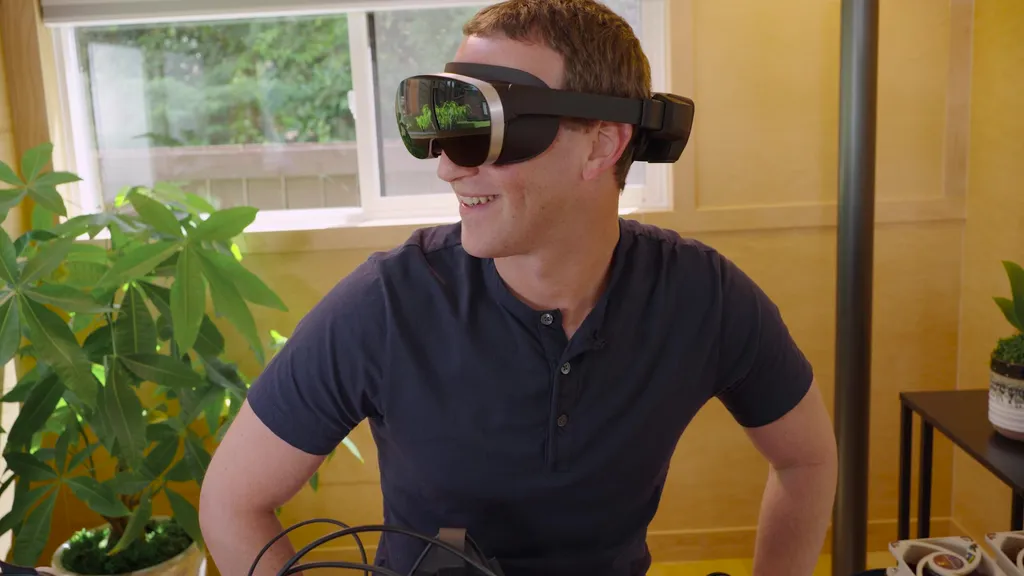Mark Zuckerberg wants Meta’s AR/VR business to be “as big as our current ad business within this decade”.
The goal was revealed earlier this month in an all-hands company meeting leaked to The Verge. It was part of a response to an employee asking how Apple’s upcoming headset and absence from the Metaverse Standards Forum will affect Meta:
Employee question: Apple is absent from metaverse standards and are coming out with their own AR glasses. How does that affect Oculus and our ecosystem? Thanks.
Mark Zuckerberg: I think it’s pretty clear that Apple is going to be a competitor for us, not just as a product but philosophically. We’re approaching this in an open way and trying to build a more open ecosystem. We’re trying to make more stuff interoperable with Android. We’re trying to develop the metaverse in a way where you can bring your virtual goods from one world to another. We created the Metaverse Open Standards Group with a bunch of other folks that you just mentioned, and Apple didn’t join. But I don’t think that’s a surprise. Apple, for a few generations of computing now, has been the closed provider of computing.
This is a competition of philosophies and ideas, where they believe that by doing everything themselves and tightly integrating that they build a better consumer experience. And we believe that there is a lot to be done in specialization across different companies, and [that] will allow a much larger ecosystem to exist.
One of the things I think is interesting is that it’s not really clear upfront whether an open or closed ecosystem is going to be better. If you look back to PCs, Windows was clearly the one that had a lot more scale and became the default and norm that people used. And Mac did fine, but I think PC and Windows were, I think, the premier ecosystem in that environment.
On mobile, I would say it’s more the other way. There’s more Android devices than there are iOS devices, but I think in developed countries and places like the US or Western Europe in kind of the high end, [and] a lot of the culture-setters and developers, I do think that skews quite a bit more towards iPhone and iOS. So I’d say on mobile, Apple has really carved out quite a good position for themselves, and that’s why they’re the most valuable company in the world, or maybe one of the couple most valuable companies in the world.
But I just don’t think that the future is written here yet for the metaverse. And I think part of our job is we’re going to continue doing leading research and pushing on this at all levels of the stack. We’re doing VR. We’re doing AR. We basically deliver our devices at cost or at a slight subsidy, or slightly more than cost in some cases. But the bottom line is our business is not primarily taking a premium on the devices. We want as many people to be interacting in there as possible. Part of that is having it be an open ecosystem that’s interoperable.
Our north star is can we get a billion people into the metaverse doing hundreds of dollars a piece in digital commerce by the end of the decade? If we do that, we’ll build a business that is as big as our current ad business within this decade. I think that’s a really exciting thing. I think a big part of how you do that is by pushing the open metaverse forward, which is what we’re going to do.
So yeah, Apple is going to be a competitor. I think that that’s pretty clear, but it’s actually a very deep competitor. It’s not just [that] they have a device that has some more features than us. It’s a very deep, philosophical competition about what direction the internet should go in. And I am proud of the investments that we’re making to help push forward the open metaverse on this and hopefully make the next version of computing a bit more open.
Targeted advertising currently makes up 98% of Meta’s revenue, bringing in over $100 billion yearly. The immense quantity of data the company holds about each user is fed into machine learning algorithms tasked with serving the ad most likely be to be clicked on. But this revenue model depends on keeping user attention – and this is bleeding to competitors like TikTok. Advertising spend is also decreasing across most industries amid a wider economic downturn.
Since acquiring Oculus in 2014 – reportedly for over $3 billion – Mark Zuckerberg has been slowly preparing to diversify Facebook’s business by “building the next computing platform”, investing tens of billions of dollars toward this goal. With the rebrand to Meta last year Zuckerberg doubled down on this long term goal and signaled he’s prepared to bet his company’s future on it.
Meta’s AR/VR division brought in just $2 billion revenue in 2021, but Q1 and Q2 of 2022 saw year-over-year growth of 35% and 48% respectively. To reach Zuckerberg’s lofty goal this growth will need to accelerate – yet in the short term CFO David Wehner told investors he expects Q3 Reality Labs revenue to be lower than Q2, following the announcement of Quest 2’s price rising by $100.






























